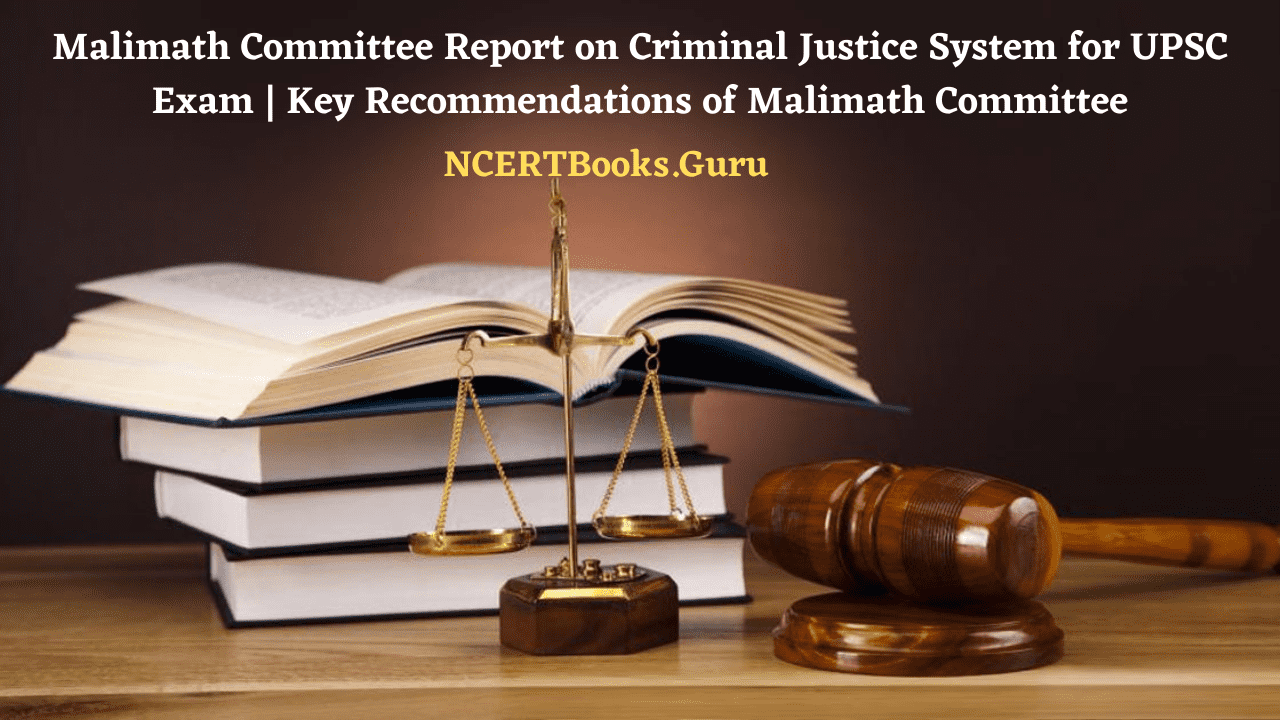Law should not stumble because those who deny it go free and those who rely on it lose hope. Malimath Committee was headed by the chief justice of Karnataka and Kerala High Courts i.e. Justice V.S. Malimath. This Committee began in the year 2000 and the Report regarding the Criminal Justice System in India was submitted to Prime Minister L.K. Advani.
Malimath Committee is a crucial topic in the Polity for UPSC Exam Preparation. This article sheds light on the Malimath Committee Objectives, Recommendations given by it, Drawbacks. The Topic is explained comprehensively keeping in mind the IAS Prelims and Mains Exam Point of View.
Objective of Malimath Committee
- The Major aim of this committee is to examine the fundamental principles of criminal law and restore confidence in the criminal justice system.
- It Involves reviewing of Code of Criminal Procedure (CrPC), 1973, the Indian Evidence Act, 1872, and the Indian Penal Code (IPC), 1860.
Malimath Committee Recommendations
- Recommendations made by the Committee after examining national systems of criminal law are given here. It proposed a shift from adversarial criminal justice system in which facts are presented by the prosecution and defense before a neutral judge with an objective “quest for truth” and the judicial officer controls the investigation of offenses.
- The Report gave suggestions on the dilution of the existing pre-trial safeguards with regards to Violence that an accused in police custody has
- For instance, the 90-day period for filing the charge sheet for an accused released on bail is doubled.
- In addition, the permissible 15 days police remand period for an accused on grave offences is also doubled.
- Malimath Committee even recommended the rights of the victim. It describes the need to reclassify offences, formulate a witness protection programme, and involve the victim in all the trial stages.
- To make investigations more effective it recommends the setting up of a State Security Commission, as recommended by the NPC so that police don’t have to face any political pressure.
- It explained clearly the definition of rape and included all forms of forcible penetration in concern to women’s movements. However, the Committee doesn’t favor the death penalty for rapists and inturn states a possible punishment as an alternative i.e. lifetime imprisonment without remission or commutation.
Do Read Similar Articles
- UPSC Topper Anudeep Durishetty Notes
- UPSC OMR Sheet PDF
- How To Read 2nd ARC Reports For UPSC
- UPSC Topper Answer Sheet Booklets
Drawbacks of Malimath Committee
Along with the Recommendations made by the Malimath Committee, there are certain flaws in it too. We tried mentioning a few of them as under
- Since the Current Adversarial System is made inquisitorial the report didn’t count the increased burden on the court, need for better infrastructure that a shift would need.
- Inquisitorial System is followed in both Germany and France. There are certain moves to be considered in the adversarial system. French System had to face a lot of criticism in recent time due to a lot of practical difficulties involved. It is necessary that the inquisitorial system needs to be studied in detail before incorporating it into the system.
- Fast-track Courts, Speedy trials, a huge undertrial population, and access to courts have been neglected.
- Crimes against members of Scheduled Castes and the Scheduled Tribes aren’t mentioned in the report.
Multiple Choice Questions on Malimath Committee
1. Malimath committee, recently in news is related with which of the following?
A. Electricity sector
B. Financial sector
C. Criminal Justice
D. Banking reforms
Answer:
C. Criminal Justice
2. Malimath committee does not deal with which of the following?
A. Code of Criminal Procedure (CrPC)
B. Indian Penal Code (IPC)
C. Defence Reforms
D. Indian Evidence Act
Answer:
C. Defence Reforms
3. Consider whether the following statement is true or false
One of the Drawbacks of the Malimath Committee Report is that crimes against members of the Scheduled Castes and the Scheduled Tribes do not find mention in the report.
Answer:
True
